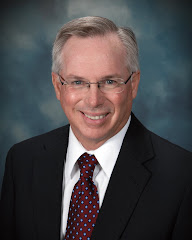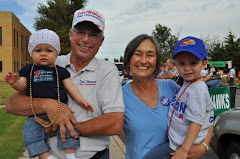Victory in Republican Primary
The August 3rd primary election is now history, and I received the vote of 84% of the voters in the Republican primary in my bid to be re-elected to the Kansas House of Representatives. I am overwhelmed and humbled that so many of my friends and neighbors throughout the district chose to support me. No one filed as a candidate of the Democrat party in this race, so my re-election in November is now pretty much assured. I have really appreciated the opportunity to represent the citizens of the 118th District in Topeka, and I look forward to continuing in that role for two more years. Thank you to all who voted for me, and thank you to everyone who helped during the campaign.
There is real value in running a campaign, and I enjoy the chance to get around the district, visit with constituents, and receive input from them. But with campaign season behind me, I now can turn my attention to policy matters and start concentrating on the issues that are likely to be dealt with in the legislative session that starts in January. If you have suggestions for legislation you would like to have the legislature consider, please contact me soon. Now is the time to do the research and preparation.
Power to the People?
Kris Kobach, who is running for Kansas Secretary of State, recently made news by advocating for Kansas’ adoption of initiative and referendum. This refers to the process whereby individuals or groups can circulate a petition on a certain issue, get that issue placed on the ballot, and hopefully have it adopted into law by a vote of the citizens. Sounds good, doesn’t it? Power to the people. Circumvent the legislative process. Get your own ideas adopted and made into law.
A number of states provide for some sort of initiative and referendum but Kansas’ constitution currently does not allow it. I believe that is a good thing. A very good thing, especially for rural Kansans and for anyone involved in production agriculture. Initiative and referendum can be a very effective tool for a highly motivated group with deep pockets. And that means that groups like People for the Ethical Treatment of Animals (PETA) and Humane Society of the U.S. (HSUS) love initiative and referendum. Both PETA and HSUS have very radical agendas that are in direct opposition to modern production agriculture. Both groups are extremely well funded by millions of urban-oriented donors, many of whom have no idea how radical the objectives of these groups really are.
PETA and HSUS have used initiative and referendum to negatively affect agriculture in other states. They have used their extensive resources to conduct slick and effective advertising campaigns to promote their issues. Those ad campaigns generally appeal to the emotions of the voters and ignore the science and economics of the issue. Several years ago I got a call from my sister, who was living in Denver at the time. There was an issue on the Colorado ballot that would have greatly affected agricultural production. I don’t remember what group carried the petition, but it was a radical group similar to PETA and HSUS. My sister was asking for my perspective because she was having trouble deciding what to think about the issue. My sister grew up on a farm, and yet this group’s emotional appeal was working on her. It was making it difficult for her to decide how to vote on the issue.
That just illustrates the disproportionate power a special interest group can exert via initiative and referendum, especially if they have access to millions of dollars to promote their point of view. Typically, industry groups and associations like Farm Bureau, Kansas Livestock Association, or Kansas Corn Growers would be greatly outgunned in their efforts to tell the other side of the story. There are groups who would love to tell Kansas farmers how to raise their livestock, what types of seeds to plant, what herbicides and fertilizer to use (and how to use them). They would even like to change the way Kansas farmers and ranchers market their products. If they had their way, via initiative and referendum, the economic viability of Kansas agriculture could be severely curtailed and the ability of Kansas farmers and ranchers to compete would be diminished.
It is not only Kansas agriculture that could be adversely affected by initiative and referendum. Consider the fact that in the last ten years eighty percent of Kansas counties have lost population, including every one of the eight counties in the 118th district. It is predicted that once the 2010 census is completed and Kansas legislative districts are redrawn, Johnson County will have picked up three and possibly four additional seats in the Kansas House of Representatives. Those seats will come from rural Kansas where populations are shrinking. Incredibly, Kansas is becoming an urbanized state! Think about the implications of that fact if Kansas were to adopt initiative and referendum. It would become increasingly likely that our urban neighbors in Kansas City, Wichita and Lawrence could and would use intitiative and referendum to adopt laws that would negatively affect rural Kansas.
Proposals that become law via the legislature must first go through the committee hearing process, where all sides have equal opportunity to chime in and discuss the pros and cons, the science and the economics of the proposal. That full discussion and consideration would not be assured with initiative and referendum. Instead, the conversation would be dominated by the side with the largest advertising budget. That cannot be good for Kansas agriculture or for rural Kansas communities.
Healthwave Backlog
The budget cuts mean less staff and less resources are available to handle Healthwave applications and reapplications, and the cuts have come during hard economic times… when greater numbers of Kansas families are qualifying for Healthwave. The result has been a serious backlog in processing applications. I recently helped a couple of constituent familes deal with Healthwave. One case was an initial application and the other was an annual reapplication. In both cases it took over 90 days from the time the application/reapplication was started until the process was completed. This was very frustrating to both families, and children’s health issues went unaddressed during that time. The application backlog at Healthwave numbers in the thousands, and the Healthwave administrators at Kansas Health policy Authority recently received a federal grant to help them catch up with the backlog. This will help, but I don’t expect any quick relief. So I am including this warning to all current Healthwave families and Healthwave-eligible families: Start the process of application or reapplication as soon as you possibly can. Document all communication with Healthwave and retain copies of all documents sent to them. Be as helpful, responsive, and prompt as you can at each step of the process. And in the end, be prepared for a lengthy wait before the application is approved. I wish things were different. In these tough times they probably cannot be.
Websites of Interest
Wheat Market Basis Controversy Anyone who raises wheat has to be concerned about the recent lack of convergence between cash wheat prices and the quoted price on the Kansas City Board of Trade (KCBT). Basis levels throughout the hard red winter wheat belt have expanded substantially in recent months. As an example, for years the local cash price for wheat in Dighton, Kansas was about forty or forty five cents below the KCBT price. High fuel prices in recent years caused that basis to increase about twenty cents. But today the cash price in Dighton is $1.35 under the KCBT price! The link is to a paper authored by Daniel O’Brien and Art Barnaby of KSU, and discusses the lack of convergence of cash and futures wheat prices, the issues that creates, and suggestions for possible solution. KCBT personnel are aware of the problem and are working toward solutions. The folks at Kansas Wheat are working with them. You may want to provide these folks with your input.
State Rankings This one is another updated rerun. Various rankings continue to show the state of Kansas is well positioned for competitive growth now and in the future.
YouCut Produced by the Republican members of the U.S. Congress, this website lists several examples of federal spending that might be candidates for budget cuts. Vote for which you would like to see cut, either through the website or by texting, and then offer your own suggestions.
Cowboy Logic: If you aim at nothing, you will hit it every time.
Quote of the Week: “ To get something done, a committee should consist of no more than three men, two of whom are absent.” - Robert Copeland
And a bonus quote this time. This could have been one of Jack Handy’s Deep Thoughts from Saturday Night Live:
“I used to think that the brain was the most important organ in the body, but then I thought… look what’s telling me that” – Emo Phillips





No comments:
Post a Comment